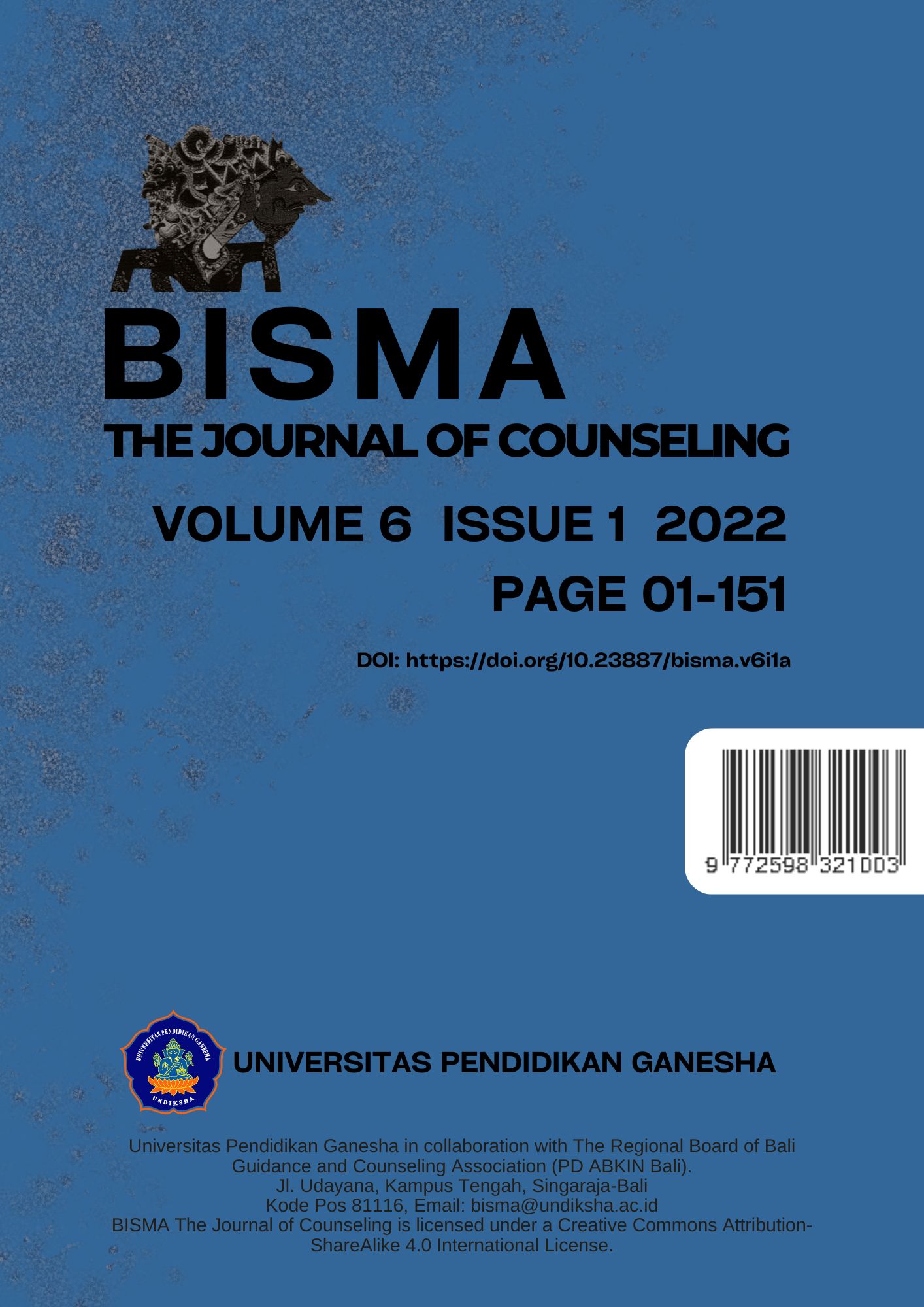Strength-Based Counseling: Alternative Counseling to Increase Student Hope during the COVID-19 Pandemic
DOI:
https://doi.org/10.23887/bisma.v6i1.45347Keywords:
Hope, COVID-19, Strength-Based CounselingAbstract
COVID-19 has affected the world of education in particular. The COVID-19 pandemic created a new conceptualization of schools with learning methods changed to learning from home, having limited interaction with teachers and classmates. Transitioning and adapting to a new way of life has an emotional impact on students. The current situation creates uncertainty, fear, and hopelessness. The emergence of despair in students is an example of the low power of hope in students, which will have a broad impact on other dimensions of life. This study is a literature review that discusses how strength-based counseling can help increase student hope during COVID-19. This literature review can be used as a reference for counselors through the self-strength counseling model.
References
Aminah, A. S., Ilfiandra, & Saripah, I. (2020). Strength Based Skill Training Untuk Peningkatan Kekuatan Harapan Siswa. Journal of Innovative Counseling : Theory, Practice & Research, 4(2), 70–85.
Bernardo, A. B. I. (2020). Measuring hope during the COVID-19 outbreak in the Philippines : development and validation of the state locus-of-Hope scale short form in Filipino. Current Psychology.
Chan, K., Wong, F. K. Y., & Lee, P. H. (2019). A Brief Hope Intervention to Increase Hope Level and Improve Well-Being in Rehabilitating Cancer Patients : A Feasibility Test. Sage Open Nursing, 5, 1–13. https://doi.org/10.1177/2377960819844381
Chen, J., Huebner, E. S., & Tian, L. (2020). Longitudinal relations between hope and academic achievement in elementary school students: Behavioral engagement as a mediator. Learning and Individual Differences, 78(January 2019), 1–10. https://doi.org/10.1016/j.lindif.2020.101824
Davidson, O. B., Feldman, D. B., & Margalit, M. (2012). A focused intervention for 1st-year college students: Promoting hope, sense of coherence, and self-efficacy. Journal of Psychology: Interdisciplinary and Applied, 146(3), 333–352. https://doi.org/10.1080/00223980.2011.634862
Egan, S. (2011). Promoting "Hope" and Well-being in Adolescents following Transition to the Secondary University of East London. The University of East London.
Feldman, D. B., & Dreher, D. E. (2012). Can Hope be Changed in 90 Minutes? Testing the Efficacy of a Single-Session Goal-Pursuit Intervention for College Students. Journal of Happiness Studies, 13(4), 745–759. https://doi.org/10.1007/s10902-011-9292-4
Feldman, D. B., & Kubota, M. (2014). Hope, self-efficacy, optimism, and academic achievement : Distinguishing constructs and levels of specificity in predicting college grade-point average ☆. Learning and Individual Differences, 1–7. https://doi.org/10.1016/j.lindif.2014.11.022
Fontenelle-Tereshchuk, D. (2021). Mental Health and the COVID-19 Crisis: The Hopes and Concerns for Children as Schools Re-open. Interchange, 52(1). https://doi.org/10.1007/s10780-020-09413-1
Gallagher, M. W., Pedrotti, J. T., Lopes, S. J., & Snyder, C. R. (2019). Hope. In M. W. Gallagher & S. J. Lopes (Eds.), Positive Psychological Assessment: A Handbook of Model and Measures (Second Edi, pp. 77–95). Washington DC: American Psychological Association.
Hartanto, D. (2017). Profil Strengt of Hope Mahasiswa Calon Guru BK Berdasarkan Faktor Budaya. JOMSIGN: JOurnal Og Multicultural Studies in Guidance and Counseling, 1(1), 1–16.
Hartanto, D. (2020). The Effectiveness of Strength-Based Counseling Model to Improve Academic Hope in Students. PSIKOPEDAGOGIA Jurnal Bimbingan Dan Konseling, 9(1), 32. https://doi.org/10.12928/psikopedagogia.v9i1.13069
Hodson, L., Maccallum, F., Watson, D. G., & Blagrove, E. (2021). Dear diary : Evaluating a goal-oriented intervention linked with increased hope and cognitive flexibility. Personality and Individual Differences, 168(August 2020), 110383. https://doi.org/10.1016/j.paid.2020.110383
Larsen, D. J., Stege, R., King, R., Egeli, N., Larsen, D. J., Stege, R., … Egeli, N. (2018). The hope college activity : an arts-based group intervention for people with chronic pain people with chronic pain. British Journal of Guidance & Counselling, 0(0), 1–16. https://doi.org/10.1080/03069885.2018.1453046
Lopes, S. J., & Snyder, C. . (2003). Positive Psychological Assessment: A Handbook of Models and Measures. New York: American Psychological Association.
Lurie, J. M., Lever, H., Goodson, L., Lyons, D. J., Yanagisawa, R. T., & Katz, C. L. (2020). Instilling Hope and Resiliency A Narrative Photo-Taking Intervention During an Intercultural Exchange Involving 9/11 Survivor in Post 3/11 Japan. The Journal of Nervous and Mental Disease, 208(6), 488–497. https://doi.org/10.1097/NMD.0000000000001152
Marques, S. C., Lopez, S. J., & Pais-Ribeiro, J. L. (2011). "Building Hope for the Future": A Program to Foster Strengths in Middle-School Students. Journal of Happiness Studies, 12(1), 139–152. https://doi.org/10.1007/s10902-009-9180-3
Marsay, G., Scioli, A., Omar, S., & Marsay, G. (2018). A hope-infused future orientation intervention : a pilot study with juvenile offenders in South Africa A hope-infused future orientation intervention : a pilot study with juvenile offenders in South Africa. British Journal of Guidance & Counselling, 46(6), 709–721. https://doi.org/10.1080/03069885.2018.1480011
Martin, F., Clyne, W., Pearce, G., Turner, A., & Turner, A. (2019). Self-Management Support Intervention for Parents of Children with Developmental Disorders : The Role of Gratitude and Hope. Journal of Child and Family Studies, 980–992. https://doi.org/10.1007/s10826-018-01308-1
Mirshafiee, N. S., & Jafari, F. (2019). How Strength-based Counseling effects on Self-Compassion and Future Time Perspective in adolescents? Journal of Neurodevelopmental Cognition, 2(1), 12–21. https://doi.org/10.29252/jncog.1.2.12
Peterson, C., & Seligman, M. E. . (2004). Character Strengths and Virtues: A Handbook and Classification. New York: Oxford University Press.
Rand, K. L., Shanahan, M. L., Fischer, I. C., & Fortney, S. K. (2020). Hope and optimism as predictors of academic performance and subjective well-being in college students. Learning and Individual Differences, 81(September 2019), 101906. https://doi.org/10.1016/j.lindif.2020.101906
Smith, E. J. (2006). The Strength-Based Counseling Model. The Counseling Psychologist, 34(1), 13–79. https://doi.org/10.1177/0011000005277018
Snyder, C. R. (2000). Handbook of Hope: Theory, Measures, and Applications. USA: Academic Press.
Snyder, C. R. (2002). Target Article: Hope Theory: Rainbow in Minds. Psychological Inquiry, 13(4), 276–321. https://doi.org/10.1207/S15327965PLI1304
Snyder, C. R., Feldman, D. B., Shorey, H. S., & Rand, K. . (2002). Hopeful Choices: A School Counselor's Guide to Hope Theory. Professional School Counseling, 5(5). https://doi.org/10.1080/01926230309811
Steinbrecher, E., Jordan, S. S., & Turns, B. (2020). Providing Immediate Hope to Survivors of Natural Disasters : A Miracle Question Intervention Providing Immediate Hope to Survivors of Natural. The American Journal of Family Therapy, 0(0), 1–16. https://doi.org/10.1080/01926187.2020.1789899
UNSDG. (2020). Policy Brief: Education during COVID-19 and beyond. https://doi.org/10.24215/18509959.26.e12
Downloads
Published
Issue
Section
License
Copyright (c) 2022 Nur Asiah

This work is licensed under a Creative Commons Attribution 4.0 International License.









